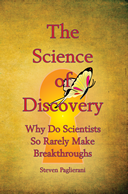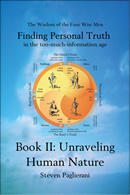What Makes Us Fat?
One of the more difficult problems people face is losing weight. In part this is due to the idea that even otherwise intelligent people believe there is an easy, fast, simple solution they can use to lose weight. In truth, no such solution exists, as losing weight is one of the most complex topics in all of human personality. This said, if you can learn to have a naturally thin attitude, you can make lasting changes with regard to fitness and losing weight. What do I mean by a naturally thin attitude and how can you achieve this state? These articles explore these topics.
Finally, know that Steven explores this topic in depth in his latest book, The Science of Discovery.
Describing a naturally thin attitude is easy. Moreover once it emerges in you, you cannot lose your understanding of it. Ever. Unfortunately getting this attitude to emerge in you is not so easy. To do this, you must have two epiphanies, one about eating and one about exercise. These articles describe this attitude and why efforts to imitate it, like weight loss dieting and kill-yourself exercise, are doomed to fail. Know these failures are no one's fault really. They occur because we've been unable to see how the mind affects the body's ability to process food and exercise. By becoming naturally thin, you reconnect your attitude to your behavior. This in turn causes you to reclaim access to some of your early childhood metabolism. Indeed, early childhood attitudes in and around food and exercise are a big part how this metabolism was created. Get them back and you get thin.
What Does It Mean To Be Naturally Thin? (an introduction) (in progress)
As I've say often, when it comes to weight management and fitness, attitude is everything. In other words, knowing what makes a person "naturally thin" is the key to successful weight management and fitness. These older articles contain some of the ideas that led to this discovery. Thus they may encourage—and even set you up—to have the epiphanies necessary to achieve a naturally thin attitude. Admittedly, some of what you'll find in them sorely lacks the clarity of the map of weight change. But being as this map takes a radically different approach to the theory of weight management, these articles may help you to bridge the gap between what is currently believed and the radically different idea of being naturally thin.
What Makes Diets Fail? (A Brief Lesson on the Differences Between "Motives" and "Reasons")
Weight and Emergence - Weight as Ranges (The Myth of Weight as a Single Number)
Weight Ranges and Conscious Eating (a Healthy Approach to Weight Management)
Emergence: Healthy Weight Loss: 2003 (A Few "More Loving Ways" to Manage Weight)
Over Eating - Under Eating (How Being in Shock Affects Weight Loss and Gain)
The Two Primary Food BLocks (Taste and Temperature: the Place to Start Healing)
To Rita: On Meditation and Conscious Eating (a Few Emergence Success Stories)
To Evelyn: On Eating While in Shock (Thoughts on Eating Ice Cream and Chocolate)
When I was 20, I watched my then 46 year old mother die of anorexia. That last day, she was 5'6" and 70 pounds. At the time, the doctors told me she was dying of a rare virus. And they were right. Being anorexic had so compromised her immune system that she was dying like an AIDS victim dies, in her case, of a common flu virus gone wild. What she didn't die from though was wanting to be thin—she constantly tried to eat more and couldn't. So when "experts" talk about anorexics as people who want to be thin, it sounds pathetically oversimplified and makes me sad and angry. If only they could set aside their "logic of the psyche" opinions long enough to actually listen to the people they claim to be able to help, perhaps then they'd realize the truth. Anorexia (the extreme version of being in a naturally thin state) and obesity (the extreme version of being in a naturally fat state) are two sides of the same coin. Bulimia is something else entirely.
Anorexia and Emergence (using symptoms to find hope)
On Shame, Fear, Bulimia, and Being Loved (asking for help)
Bulimia and Finding Hope (some thoughts on where to begin)
When I wrote this series of articles in 2004, I knew states of consciousness had a lot to do with successfully managing body weight. But I had yet to discover that the tendency to gain or lose weight is a tipping point rooted in attitudes, not behavior. This said, much of what I wrote here is still relevant and useful. Body weight still changes in ranges, not pounds. Metabolic transitions are still a key factor in successful weight management. And conscious eating is still the core component in any weight loss program.
Losing Weight Consciously (Introduction)
Metabolism and Weight Loss (what is metabolism?)
Metabolic Transitions and Weight Loss (what are metabolic transitions?)
Weight Ranges and Weight Loss (what are weight ranges?)
Conscious Eating and Weight Loss (what is conscious eating?)
Closing Thoughts on Losing Weight Consciously (summary)
Many people lose weight. Few keep this weight off. This is largely due to the fact that most people focus almost all of their efforts on changing what they do rather than on changing who they are. The Yellow book is designed to help you to explore your attitudes in and around all things related to food, eating, weight loss and gain. Done honestly and from the heart, it can provoke life changing ahas in you, including things like that weight changes in ranges not pounds, that how much you eat on any given day does not translate to how much you weight the next day, that overeating one day can at times even lead to weight loss the next day, and that a 4 ounce muffin can't possibly account for a 3 pound weight gain. Indeed, many people who do the yellow book even once come away with a genuine love for weighing themselves, even on mornings when they overate the previous day. All this change in just 91 days.
Introduction to the Yellow Book (91 days of conscious eating)
Day 0 ~ the Day Before (picture what you expect this experience to be like and write about it)
Week 1 ~ AM (my thoughts on weight)
Week 1 ~ PM (I noticed I hurried today when I . . .)
Week 2 ~ AM (my thoughts on weight change)
Week 2 ~ PM (I noticed I was absent today when I . . . )
Week 3 ~ AM (my thoughts on weight and health)
Week 3 ~ PM (I hate it when I . . . right before, during , of after I eat)
Week 4 ~ AM (my thoughts on weight change)
Week 4 ~ PM (today, I did or did not notice the taste of . . . )
Week 5 ~ AM (my thoughts on weighting myself)
Week 5 ~ PM (today, I felt . . . right before, during , of after I eat)
Week 6 ~ AM (my thoughts on clothing and diet)
Week 6 ~ PM (I noticed I felt compelled to . . . right before, during , of after I eat)
Week 7 ~ AM (my thoughts of food and love)
Week 7 ~ PM (today I noticed I prevented myself from . . . right before, during , of after I eat)
Week 8 ~ AM (things I hate about eating and food)
Week 8 ~ PM (tell a meal time story)
Week 9 ~ AM (things I hate about myself and food)
Week 9 ~ PM (exploring hunger by delaying my meals)
Week 10 ~ AM (exploring my discomfort in and around weighing myself)
Week 10 ~ PM (exploring my ability to not think about eating)
Week 11 ~ AM (more things I hate about myself and food: sharing my food)
Week 11 ~ PM (memories in and around how my father ate)
Week 12 ~ AM (examining how who, what, where, and when affect my eating)
Week 12 ~ PM (memories in and around how my mother ate)
Week 13 ~ AM (control, humor, and teaching children- more of my attitudes)
Week 13 ~ PM (exploring what I see in my future)
Day 91 (picture what this whole experience was like and write about it)
Summary Sheet (the 91 day record keeping sheet)
In November 2000, I decided to do an experiment. I wanted to see how paying attention to attitudes about food, weight, and fitness would affect people's body weight and sense of fitness. To do this, I asked a number of people to dialogue with me through emails. I then sent them daily exercises for the next thirty days designed to raise their consciousness in and around food, weight, and fitness. To my surprise, this experiment in conscious eating led some people to lose weight without dieting. And in one case, a man lost no weight but reported feeling more fit. What I've posted below are the assignments I sent and some transcripts of people's responses. Know the assignments are still relevant, and that doing this one month of assignments can raise your awareness. Indeed, doing them may actually lead you to heal some of what prevents you from eating consciously.
Introduction to the Food Week Experiment
Week One: Hurry and Urgency
Week One AssignmentsObservations and Feedback
Week Two: The Four Tastes
Week Two AssignmentsObservations and Feedback
Week Three: Temperature and Texture
Week Three AssignmentsObservations and Feedback
Week Four: Noticing Hate
Week Four AssignmentsObservations and Feedback
Closing Three Days: Sharing Your Discoveries
Week Five AssignmentsObservations and Feedback
Summary
A Final Look at Our JourneyEncouraged by what I saw in the November 2000 Food Month experiment, I decided to repeat this exercise In January 2001. Again, I wanted to see how paying attention to attitudes about food, weight, and fitness would affect people's body weight and sense of fitness. Again, I asked a number of people to dialogue with me through emails. I then sent them daily exercises for the next thirty days designed to raise their consciousness in and around food, weight, and fitness. I've reposted the assignments I sent and some transcripts of people's responses below. Know that doing this one month of assignments can raise your food and eating awareness. Indeed they may actually lead you to heal some of what prevents you from consciously eating.
Week One: Hurry and Urgency
Week One AssignmentsObservations and Feedback
Week Two: The Four Tastes
Week Two AssignmentsObservations and Feedback
Week Three: Temperature and Texture
Week Three AssignmentsObservations and Feedback
Week Four: Noticing Hate
Week Four AssignmentsObservations and Feedback
Closing Three Days: Sharing Your Discoveries
Week Five AssignmentsObservations and Feedback
Summary
A Final Look at Our Journey



